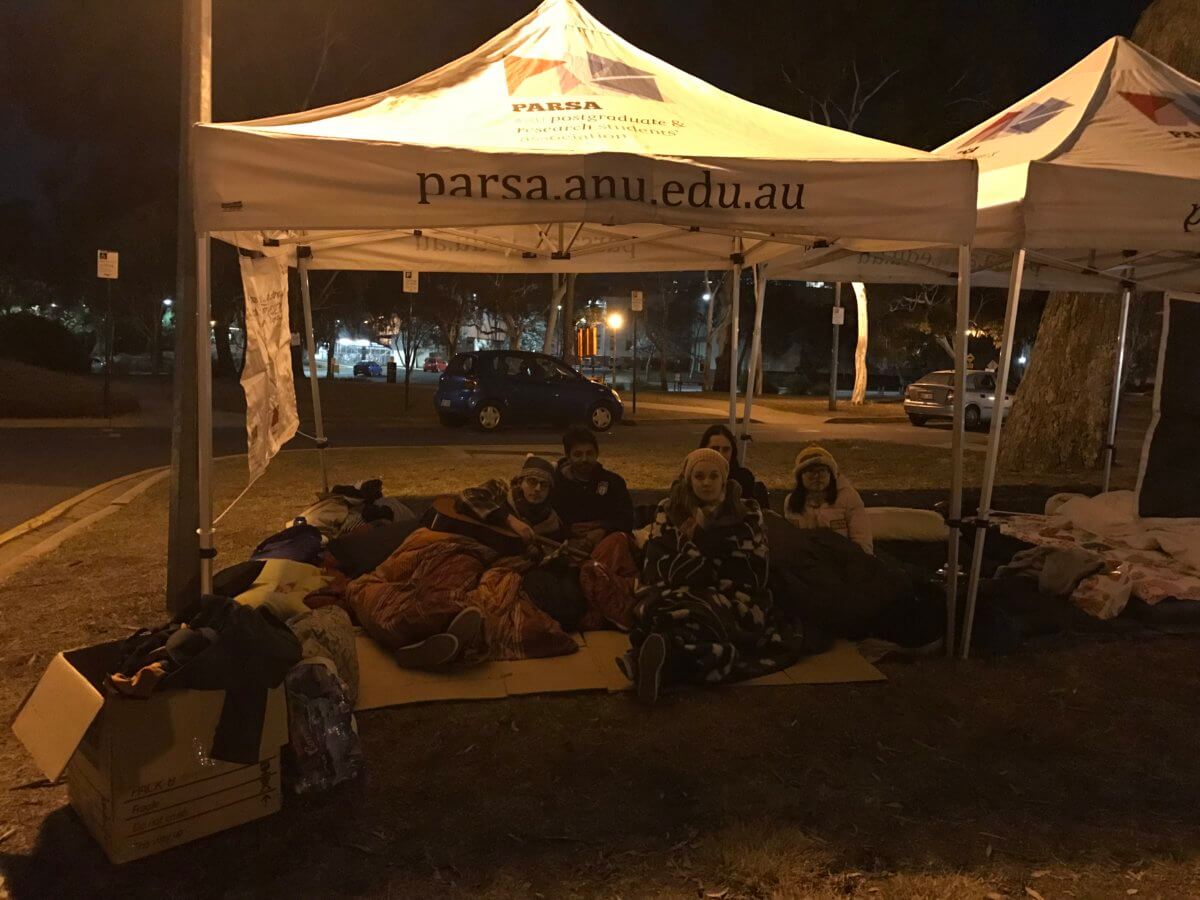Yesterday night students from PARSA slept outside the ANU Chancelry in protest of a perceived ‘ambivalence’ by the university towards the difficulties experienced by many postgraduate students in finding secure accommodation.
In a statement released by PARSA, President Alyssa Shaw said the reason for such a protest was to ‘make the point that the university needs to take our concerns seriously, and realise that this issue isn’t going away.’
The protesters shared stories of how they were currently facing accommodation problems or had seen friends experience homelessness due to the limited options available on campus, high rents and Canberra’s highly competitive rental market. Extended periods of uncertainty, leaving some students to sleep in cars or libraries, is common for students who experience difficulty finding accommodation in Canberra.
With the temperatures dropping to -2°C, the protest forms part of PARSA’s ongoing Home Away From Home campaign. This focuses on the difficulty experienced by postgraduate students when trying to finding accommodation, with the ultimate goal of ‘creating structural and systemic change’.
The campaign also features a report of the same name, which looked at evidence and information gathered in 2017-2018 accommodation survey. The report showed that 2.5% of respondents were homeless when they first arrived in Canberra. 57% of respondents didn’t have any pre-arranged access to accommodation upon arrival, many of whom did not find secure accommodation for upwards of one month. At the time of the report, 9% of post-graduates were homeless or at risk of homelessness.
The report makes a number of recommendations, most with the purpose of ensuring ANU provides post-graduate students with ‘the opportunity to secure quality and affordable accommodation at the start, and throughout their years in Canberra.’
These recommendations include a guarantee of accommodation during students’ first year of study, greater provision of family-friendly accommodation, and a commitment from ANU to align offer timelines with accommodation deadlines.
In a statement to Woroni, an ANU spokesperson said that ANU plans to provide the recommended accommodation guarantee by 2021, and that ANU is ‘committed to increasing the provision of family-friendly accommodation’. In regard to better aligning offer timelines with accommodation deadlines, the ANU is ‘looking’ to do so.
Following on from the initial campaign and report, PARSA has increased its efforts to highlight and visualise the stressful conditions faced in finding accommodation through a photography exhibition it held from 16-27 July. This showcased photos and stories of eight post-graduate and research students’ experiences.
The photo series featured the works and experiences of five international students, as well as 3 domestic students. The difficulties faced by international students are made worse due to their status – only one-third of this community are likely to have found secure accommodation by the time they arrive in Canberra.
Mingxin, an international student featured in the photo series, mentioned the difficulty faced due to being ‘unfamiliar with local regulations’ and the general application process. Varun, another featured student, highlighted the fact that international students often lack steady job, income, and an Australian rental history due to their being from overseas. When all these things factor into landlord preferences, it becomes clear that first year international students are at a clear disadvantage.
High rental prices further increase difficulty in finding secure accommodation for many students, both domestic and international. According to Domain’s recent quarterly report on weekly house rent, Canberrans pay some of the most expensive rental prices in the country. The median weekly price for rent on a house in Canberra is $530, second only to Sydney at $550 a week.
Though subject to availability, PARSA can provide up to seven nights’ shared accommodation at Youth Hostel Australia, covering the cost of the accommodation itself. This serves the purpose of providing emergency accommodation and shelter for those lacking such accommodation due to unforeseen circumstances. PARSA also provides Housing Tips and a useful page explaining potential avenues for finding accommodation.
We acknowledge the Ngunnawal and Ngambri people, who are the Traditional Custodians of the land on which Woroni, Woroni Radio and Woroni TV are created, edited, published, printed and distributed. We pay our respects to Elders past and present. We acknowledge that the name Woroni was taken from the Wadi Wadi Nation without permission, and we are striving to do better for future reconciliation.
